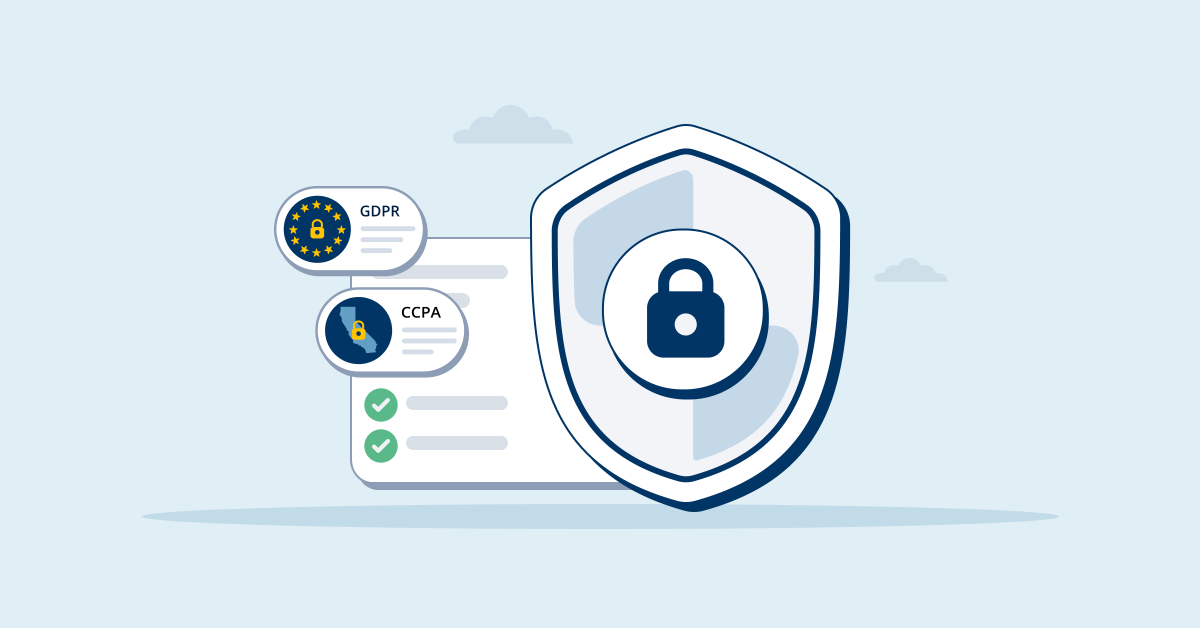Knowledge - 14 May 2021 | By TermsHub
Updated at: 09 December 2021
What Is a Privacy Policy? (+ Why You Need One)

What Is A Privacy Policy: The Definitive Guide
Perhaps one of the most hotly debated topics in the digital age, a privacy policy is seen as a fundamental right. Whether knowingly or not, many companies share large quantities of personal information with third-party companies. For this reason, privacy policies are enacted to govern how personal data is shared and when. Unfortunately, websites are worldwide, and geographic locations are so vast that it is hard to ensure that all forms of privacy are truly protected truly.
Many websites pop up seemingly overnight, which can lead to a serious lack of transparency regarding their privacy policies. Yet, it is perhaps the most critical aspect of protecting a user’s identity when using the Internet. If you’re developing your website, make sure you don’t publish any content without having a privacy policy that helps protect you as a company and visitors to your website.
What Exactly Is A Privacy Policy?
All websites are required to have a privacy policy. This publicly published document initially entails breaking down how a company will analyze, utilize, and store personal data submitted by visitors. Personal information is different based on the industry of the website and its purpose when the data is first collected.
It is generally agreed that most privacy policy statements will include explanations of how your name, birthdate, physical address, email address, payment details, location, and social security is handled. In addition, depending on the company, they will provide legal information on how this data is handled and whether there is any cause for concern.
In a privacy policy, companies will also cover their obligations to keep your information safe and secure. This is, of course, the legal part of the privacy policy that outlines whether you have any recourse in the case of a data breach and whether a company can be held liable for said data breach. It is worth mentioning that most corporations have this information written by a lawyer or at least looked at by one to eliminate the potential for suing in case of a mass data breach on their site.
Is A Privacy Policy A Necessity?
The short answer is yes! Almost all countries worldwide require a company to have a privacy policy in place to protect its users. But, of course, these legislations will vary widely based on location as countries and even states themselves may choose to govern their privacy policies differently.
Privacy In The United States
There is no privacy policy legislation written in the United States on the federal level. However, suppose your company and its users are located in California. In that case, The California Online Privacy Protection Act regulates that any website collecting personal information must conspicuously place its privacy policy where everyone can see it.
If your business makes more than 25 million dollars in revenue and has at least 50,000 users, an added piece of legislation requires transparency regarding how information collected is used.
Third-Party Services Require Privacy Policies
When your company needs to use a third-party website for any number of reasons, your website needs to have its own privacy policy in place to comply with its terms of service.
Google Analytics and AdSense are perfect examples of cases in which you can only use the websites if you have a transparent privacy policy that includes your collection of cookies. Failure to comply with their terms will mean you’re ineligible to use their services, and this can negatively impact your business all around.
A Policy Provides Transparency
The more we rely on technology, the more we value our privacy. This is especially the case with companies requiring an invasive amount of information to provide services. In order to foster a relationship built on trust, it is essential to provide transparency as to how a user’s data is used and stored.
Most people will deem a website unworthy of their interaction or untrustworthy if they’re not clear on how personal data is handled. This alone can easily become a major hurdle if you’re noticing a drop in the number of consumers willing to deal with your company.
What’s In A Privacy Policy?
Some aspects of writing your privacy policy are considered standard and are always included in the text. However, how intricate and detailed your policy needs to depend significantly on the nature of your business and the information you need to collect. Additionally, the location of your company and the location of your users will also play a significant role in determining what you should include.
It is also possible to use a privacy policy generator to give you a basic outline of something you can use on your website. A good generator can create a policy that will adhere to most third-party guidelines while still retaining transparency for your company.
An ironclad privacy policy should include at least the following:
– How personal information is collected and used. This may seem straightforward, but users will wish to make an informed decision about why you need to collect their personal information, how it’s stored, and what you can do with it. If specific data collected is an essential factor in allowing your website to function, you should mention this at the start.
– Mention your collection process as well! Many companies overlook letting users know that they may be tracking their location in the background or collecting other analytics without users’ awareness. This is always something your company should remain transparent about.
– Your users will finally know why you collect information but dedicate a section that in-depth explains what you will do with it. This is hands down the most crucial part of a well-written privacy policy. It is also worth mentioning that selling your users’ information to third-party companies is vastly different than needing the data to ensure the functionality of your website.
– Security of personal information is yet another pivotal section that should always get included in a privacy statement. Would you please make sure you explain to users how your company intends to protect their personal information and what you’re visibly doing to ensure that it is safe? Though you may do your best to safeguard everything, it is worth mentioning that specific scams aren’t your company’s liability.
– Give your users the ability not to share every piece of information or to opt-out of sharing if it’s something they feel uncomfortable with. If this can negatively impact their website usage, this is also the ideal section to let them know how it would.
– Cookies are something that every website will collect, but how you store and use them is once again something you should have a separate policy outlined for. Make sure you create a separate link for your cookies policy to decide if they wish to opt-in.
– Is your website going to share users’ data with other companies? This may be a necessity in some instances, such as when you use a third-party payment processor. Ensure you let your users know how long you intend to keep their personal information on file and where the data may get shared.
Make It Easy For Users To Contact You
Users may still have some remaining questions left about your privacy policy. For the sake of transparency and providing honest insight to your company, make it easy for anyone to contact your staff directly. Post your email address and phone number so users can get in touch with any serious concerns they may have about the policies enacted.
There Are Penalties For Non-Compliance
First and foremost, as a company owner, you need to consider the nature of your business and transactions. If there is additional data you may collect and use, by all means, add it to your privacy policy.
Depending on where you live, and the headquarters of your company, non-compliance with privacy policy laws may subject you to legal proceedings and fines.
Where To Place Your Privacy Policy
It is common practice to place your privacy policy in the footer section of your website. However, it should never remain hidden or hard to find under any circumstances. To stay honest and transparent, it is also advisable to prompt users to read your privacy policy practices during different times while using your website. You can create a popup that asks users to read it and click agree or exit after they are done scanning the material.
The Final Verdict
A privacy policy is a necessary bit of legal text on your website that outlines how certain user information is stored, collected, and shared. It also highlights your intentions for use as a company and can have your back should a user seek legal help for non-compliance. Depending on where your company is headquartered, not having a privacy policy in place may also come with legal ramifications.


